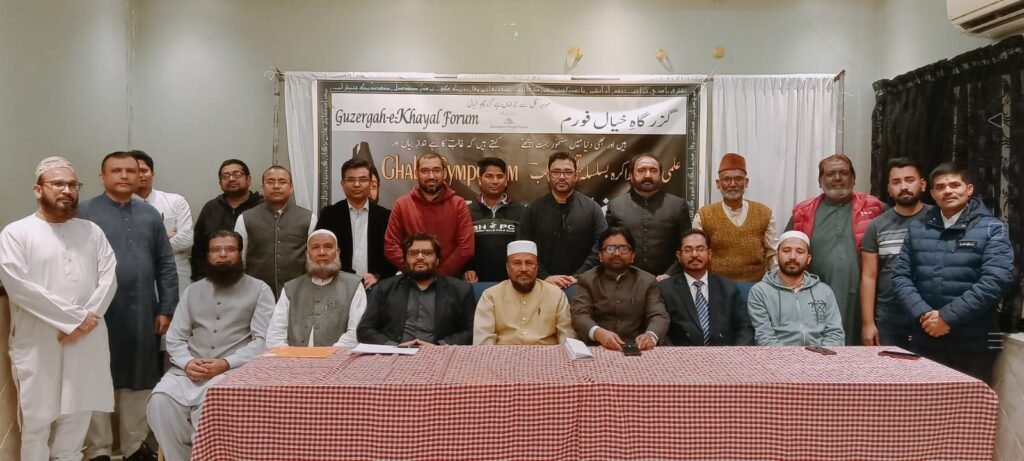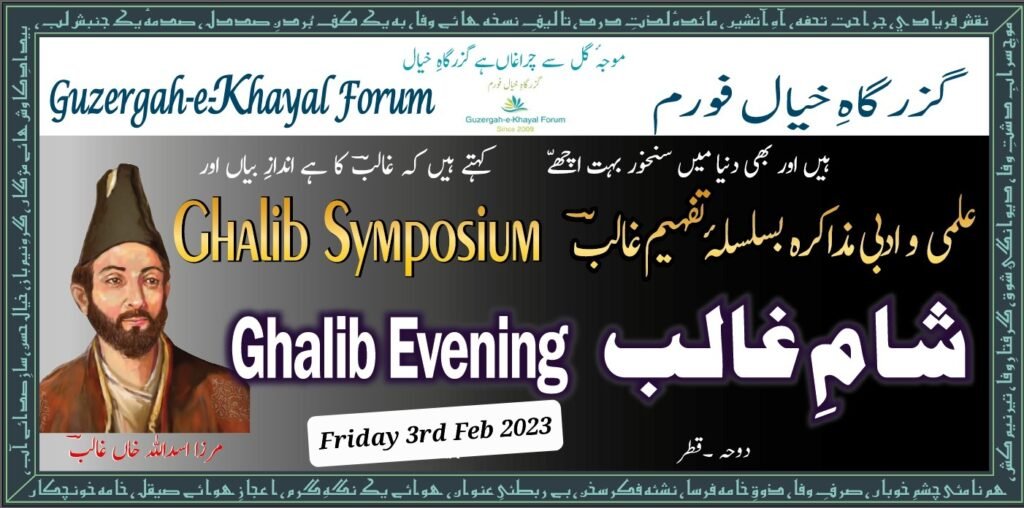Doha, 19 Feb. 2023
The Guzergah-e-Khayal, a Qatar based Urdu literary forum recently organised a "Ghalib Evening" (Dec. 1797-Feb.1869), literary seminar, paying homage to the legendary Urdu and Persian poet from the Indian subcontinent, Mirza Asadullah Khan Ghalib.
The seminar was held at the Mazza Restaurant in Qatar and was attended by literary enthusiasts and experts, who came together to celebrate the timeless beauty and artistic brilliance of Ghalib's poetry.
Ghalib, born in 1797 in Agra, is one of the greatest poets of all times in Urdu and Persian languages and his works continue to be widely read and admired today.
Ghalib mastery of the Urdu and Persian languages, combined with his unique perspective and lyrical prowess, has earned him a place of honour among literary giants of the subcontinent.
The Guzergah-e-Khayal Forum, founded by Dr Faisal Hanif in 2009, has been dedicated to promoting a deeper understanding of Ghalib's poetry and philosophy.
The forum has been conducting monthly symposiums that critically appraise Ghalib's works and provide a platform for literary discussion and exchange. To date, the forum has examined 115 of Ghalib's ghazals, with noted literary figures, poets, writers, and Ghalib experts participating in the discussions.
The "Ghalib Evening" seminar was a testament to the forum's commitment to promoting the legacy of Ghalib. The programme was filled with a series of essays and talks by noted literary experts, each of whom shed light on various aspects of Ghalib's life and work.
Mohammed Rafique Shad Akolvi, president of Bazm-e-Urdu Qatar, Another Doha based Urdu literary forum presided over the seminar while Iftekhar Raghib, Bazm’s general secretary and Dr Ayaz Ahmed were the chief guests. Local poet Muzaffar Nayab was the guest of honour.
Mohammed Rafique Shad Akolvi presented a welcome note and an essay entitled "Understanding Ghalib and Guzergah-e-Khayal.
Welcome note followed a humorous letter from Mirza Ghalib imagined by Dr Faisal Hanif, the founding president of Guzergah-e-Khayal and chairman of Bazm-e-Urdu Qatar. The letter, written in classic Urdu, showcased Ghalib's wit and humour, and was a fitting tribute to the great poet.
Rashid Alam's essay, "Ghalib's Uniqueness", explored why Ghalib is considered a unique poet, highlighting his mastery of language, his innovative style, and his ability to convey complex emotions and ideas through his verse.
Muzaffar Nayab's essay, "Ghalib's Work on Tareekh-goi," delved into the genre of poetry that involves embedding a specific event from history into a short poem. Ghalib was an expert in this form of poetry, and Nayab's essay provided valuable insight into his skill and technique.
Dr Faisal Nazir's essay, "My introduction to Ghalib" emphasized the significance of Ghalib's work in the world of Urdu and Persian literature. He noted that Ghalib's poetry remains as relevant today as it was when he first wrote it, and that his words continue to inspire and captivate readers of all ages.
Dr Wasi Bastawi's essay, "Was Ghalib a Divine Poet? In the Light of the Book 'Ghalib-shikan/the Ghalib Breaker'” by Yaas Yagana (1884-1956) evaluated Ghalib's work in the context of Yagana's criticism of the poet. Yagana, a poet and critic from the last century, had criticized Ghalib for a number of reasons, and argued that he was not the best of all poets. However, Bastawi's essay demonstrated that Ghalib's work has stood the test of time, and that Yagana's objections have been largely rejected by the mainstream literary community and scholars.
Iftekhar Raghib in his essay "Ghalib's wine, wine or science," presented research that argued that Ghalib's couplets contained explicit references to scientific concepts, including ideas from theoretical physics. This was based on the premise that Ghalib was well-acquainted with Westerners living in British India who were familiar with the advancement of science during that period.
Ateeq Anzar, in his talk on "Ghalib's relevance and theological views," emphasized that Ghalib was a firm believer in religion and that his works reflected his deep faith. Dr Ata-ur-Rahman Siddiqui, in his essay "Historical events in Ghalib's poetry," explored the ways in which Ghalib drew inspiration from historical events to convey a message and make a point.
The Ghalib Evening was concluded with a presentation of Ghalib's ghazals by a select group of individuals, who captivated the audience with their renditions. Those who presented Ghalib’s ghazals were: Sheraz Ahmed Bakali, Waseem Ahmed, Mansoor Aazmi, Dr Wasi Bastawi, Iftekhar Hussain Kazem, Adeel Akbar, and Inaam Aazmi. Muzaffar Nayab and Iftekhar Raghib presented their poetic work where they borrowed one line from Ghalib’s couplet and added the other of their own.
In conclusion, the Ghalib Evening seminar was a truly remarkable event that showcased the enduring legacy of Mirza Ghalib and the dedication of the Guzergah-e-Khayal Forum to preserving and promoting his work. Audiences thoroughly enjoyed the programme and exhibited interest to attend future events hosted by the forum that continue to shed light on the literary and cultural significance of Ghalib's poetry.












